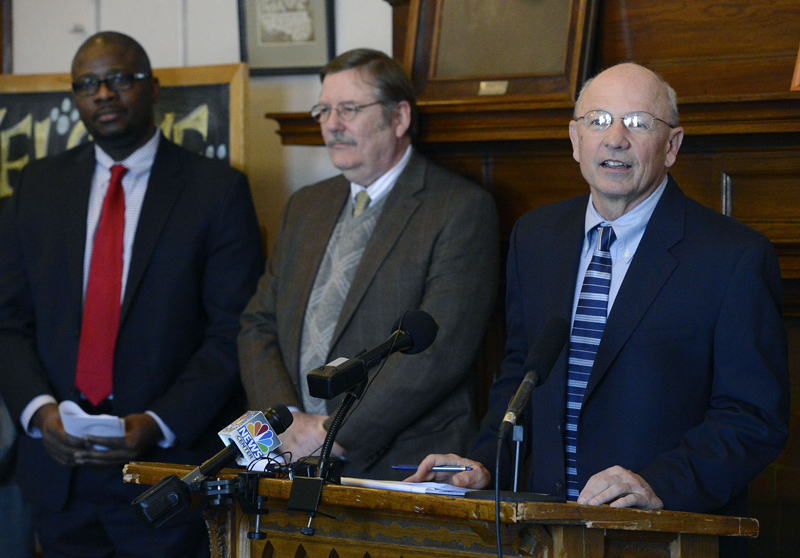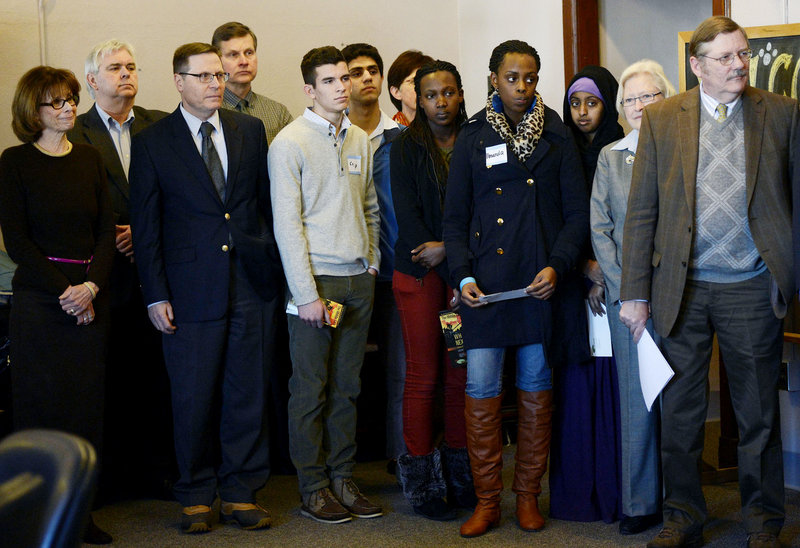PORTLAND — Mayor Michael Brennan on Monday introduced a new community coalition that will aim to increase high school graduation rates and provide employers with skilled workers, starting with improvements in early-childhood education.
Brennan formed Portland ConnectED with partners from the education, business, nonprofit, civic and philanthropic sectors, to promote early-childhood education, kindergarten through 12th-grade literacy, and post-secondary training.
One goal of the partnership is to establish a multimillion-dollar endowment to help Portland high school graduates afford college. A full-time executive director, funded by the John T. Gorman Foundation, will run Portland ConnectED. “This is one of the most significant and far-reaching educational partnerships in the history of the city of Portland,” Brennan said. “Not only does this put us in the leadership role for the state, but it catapults us to a leadership position nationally.”
For now, ConnectEd is being paid for entirely with private funds, Brennan said Monday.
“Because of the generous grant from the Gorman Foundation, we’re going to be able to do this without any additional cost to Portland taxpayers or the public at this point,” Brennan said. “(But) I’m not going to be held to that promise forever.”
Specific initiatives and benchmarks are still being developed. In addition to helping graduates afford college, the group intends to increase kindergarten readiness, help students reach grade-level reading proficiency by third grade and exceed a 90 percent high school graduation rate.
Other founding partners of Portland ConnectEd are: Creative Portland, the Sam L. Cohen Foundation, the Gorman Foundation, the Opportunity Alliance, the Portland Public Library, Portland Public Schools, the Portland Regional Chamber, Southern Maine Community College and the United Way of Greater Portland.
The Gorman Foundation has contributed $75,000, which pays for a full-time executive director and staff support for ConnectED.
Mike Dixon, 40, is ConnectED’s executive director. The Munjoy Hill resident has experience in juvenile justice and law, and 10 years of teaching experience in Boston- and Paris-area schools.
“One of the unique things about this is, we have dedicated staff,” Dixon said. “This is my full-time job.”
Dixon said his role is to keep the initiative moving and partners communicating. He expects to spend a day a week with the project’s partners, particularly City Hall, the school district, United Way and the Gorman Foundation.
Brennan and the Portland Regional Chamber are working on a plan to establish a $2 million to $5 million endowment to help Portland high school graduates attend college.
A central focus of the group is to help the city’s youngest students get off to a good start.
Suzanne McCormick, chief executive officer of the United Way of Greater Portland, said 85 percent of a child’s brain is formed by the time the child enters kindergarten. “If we only start thinking about what they’re going to do once they get to kindergarten, we have failed them,” she said.
Tony Cipollone, president and CEO of the John T. Gorman Foundation, said reading proficiency is an important milestone for a third-grader.
“That’s when kids stop learning to read and start reading to learn,” he said.
Cipollone said students who leave third grade without the commensurate reading ability are much more likely to drop out of school before graduation.
In Portland, about 66 percent of students reach reading proficiency in third grade, which he said is slightly below the state average. Cipollone said only 48 percent of low-income students achieve proficiency, compared with the 81 percent proficiency rate of higher income students. “We have work to do on that front,” he said.
Ultimately, the group hopes to provide more of the skilled workers that some employers say are now in short supply.
Gone are the days when employers could wait for the education system to provide them with the work force they needed, said Chris Hall, acting chief executive officer for the Portland Regional Chamber.
The chamber will help provide resources, including “nontraditional funding,” such has paying for day care or transportation, Hall said.
Brennan noted a recent article in The New York Times, which said a college degree is now as essential as a high school diploma.
“If you simply have a high school diploma, your ability to compete even for entry level positions has been compromised,” Brennan said.
Randy Billings can be contacted at 791-6346 or at:
rbillings@pressherald.com
Twitter: @randybillings
Send questions/comments to the editors.





